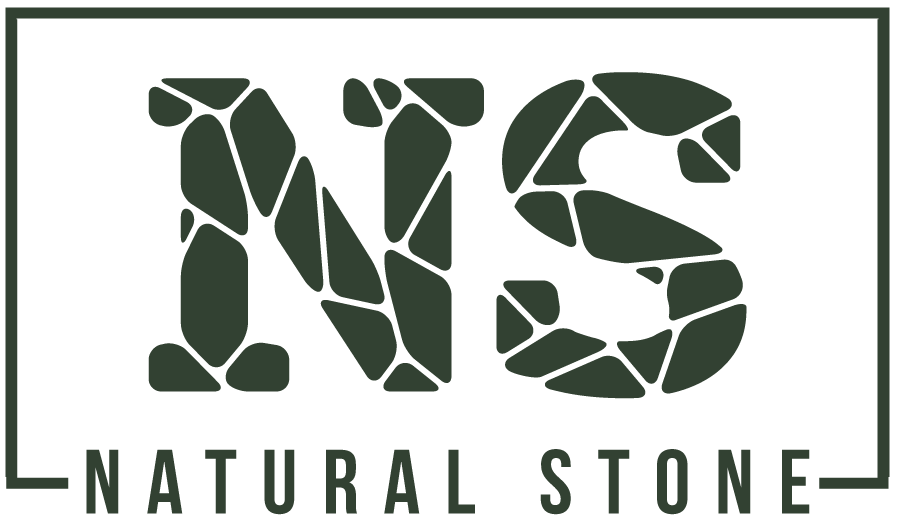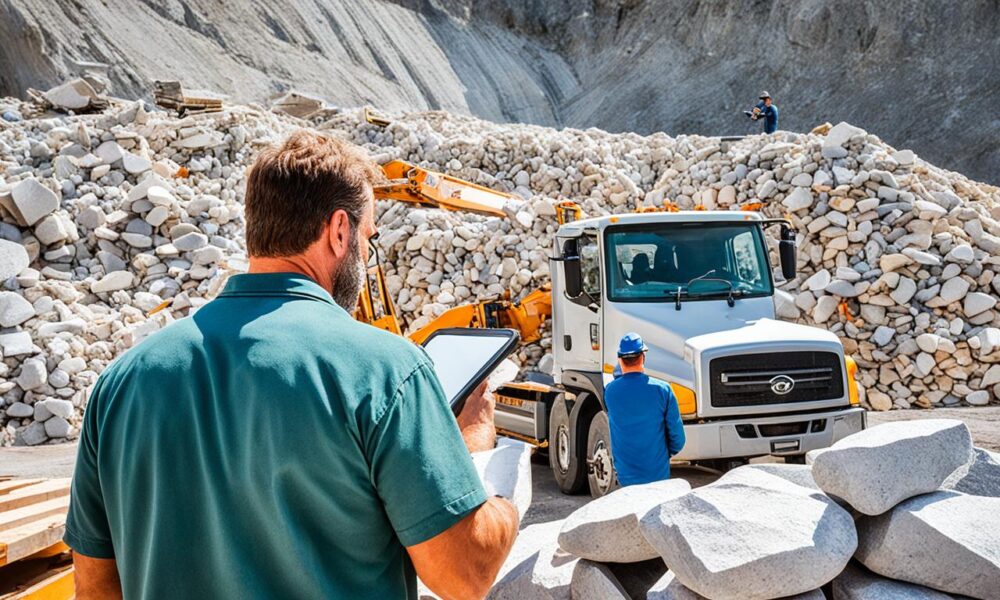Evaluating Natural Stone Suppliers: Key Considerations
Choosing the right natural stone supplier involves many steps. First, understand your project’s specific needs. Know the stone’s properties and make sure the supplier follows strict standards. Tests like ASTM C97, which check for water absorption and density, are key1. They help predict how the stone will fare in various settings. Also, natural stones have specific gravities between 2 and 3. This range helps in figuring out their densities for better selection1.
Now, considering the stone’s compressive strength is less critical in modern designs. Yet, knowing its resistance to wear and tear, like through ASTM C241 and C1353 tests, remains crucial1. This careful evaluation leads to choices that are both strong and beautiful. Also, stones like marble, granite, and limestone serve different purposes and benefits. Understanding these is vital2. Having a variety of these stones locally available and keeping strong ties with suppliers and clients matters greatly2.
Key Takeaways
- Understand the significance of ASTM tests for assessing natural stone performance.
- Consider the specific gravities of stones for accurate density determination.
- Focus on abrasive hardness tests to evaluate resistance to foot traffic.
- Select natural stones like marble, granite, and limestone based on project needs.
- Build strong supplier-customer relationships for successful procurement.
Understanding Your Project Needs
Starting a project with natural stone means you must know exactly what you need. You have to pick the right kind of stone, figure out how much you need, and decide how it should look and feel. These choices are essential for choosing the best stone supplier.
Identifying the Type of Natural Stone
First, find out which stone is perfect for your project. You could choose from marble, granite, limestone, basalt, or sandstone. Each has its own look and features. For instance, marble is elegant, while granite is known for its toughness. You also need to think about the stone’s use, like for floors or walls, which affects your choice3. Keep in mind, natural stone usually keeps 93% of its value, making it a solid investment4.
Determining Quantity and Dimensions
Knowing the right amount and size of stone is key. Measure the area you want to cover carefully. Think about the stone’s thickness and overall size to prevent running out or having too much. Lighter stones like natural thin stone veneer work well for outer walls and outdoor spaces, and it’s less heavy than 15 lbs per square foot4. It’s important to plan for how heavy your stone choice is, like concrete panels that weigh about 10 lbs per square foot, for easy installation3.
Specifying Finishes and Design Aspects
Last, decide on the stone’s finish and design details. The finish—polished, honed, or rustic—greatly affects the look. Choosing the right colors ensures the stone fits your design vision3. Pick the shape that matches your project’s style—regular shapes for a classic feel or uniform for a modern look. These choices help you find suppliers who meet your specific needs3.
Evaluating Stone Supplier Quality
Figuring out if a stone supplier is good involves looking at many parts. You have to check their selection of stones, the reputation of their quarries, and the overall quality. These points are key in correctly assessing a stone’s inventory.
Scrutinizing Inventory and Selection
Analyzing the stone variety and quality available is essential. Tendata iTrader provides access to customs data from 70 countries and business details from 198 countries. It also includes over 10 billion trade records and detailed information on 120 million companies, and a database of 130 million buyers. This wealth of information helps companies understand market trends and decide which markets are most profitable5. So, it’s smart to choose suppliers with a wide and varied stock to suit different needs.

Sources and Quarry Reputation
Learning where the stone comes from is vital. Stones from well-known quarries that meet industry rules, like ASTM tests, are usually more durable6. Low water absorption, for example, means the stone holds up better against damage6. It’s best to work with suppliers linked to reputable quarries that follow these strict guidelines. This ensures you get top-notch materials for your project.
Comparing Quality Across Suppliers
Comparing stone quality among different suppliers is crucial. Look at the stone’s color and pattern uniformity, strength, and how well it stands up to wear and tear6. Norstone, for one, tests their products at independent labs certified by ASTM. They share these test results on their website for everyone to see6. Paying attention to these factors helps in finding the best and most consistent stones. It guarantees a high-quality finish in the end.
Making a wise choice in stone supplier quality means considering all these factors. It ensures your projects look and perform great.
Evaluating Natural Stone Suppliers: Key Factors to Consider
When looking into natural stone suppliers, it’s essential to see their variety of stones. It’s key to inspect the stones yourself for consistent colors, even patterns, and flawless surfaces7. Also, you must check the stone’s physical properties. Details like how well the stone can resist scratches, support weight, and absorb water matter a lot for its use7.
ASTM and ANSI set the rules for checking these properties. For example, ASTM C241 and ASTM C1353 tests show if a stone is good for floors by checking abrasion resistance. ANSI 326.3 looks at how slippery a stone might be8. Knowing these rules helps decide if a supplier’s quality is up to the mark.
The table below summarizes the ASTM standards for stone qualities. It helps to pick the right supplier:
| Stone Type | Water Absorption (%) | Compressive Strength (MPa) | Abrasion Index (Ha) |
|---|---|---|---|
| Granite | 0.40 | 131 | 25 |
| Marble | 0.20 | 52 | 10 |
| Quartz-based | 8 (sandstone), 3 (quartzitic) | 27.6 (sandstone), 68.9 (quartzitic) | 2 (S), 8 (QS) |
| Limestone | 12 (low-density), 7.5 (medium-density), 3.0 (high-density) | 12 (low-density), 28 (medium-density), 55 (high-density) | 10 |
| Slate | 0.45 | 8 | 8 |
Building good relationships with distributors is very important. Talking regularly with wholesalers helps solve problems quickly and well7. It’s crucial to use the Mohs Hardness Scale and C97 tests for materials on counters and wet areas8.
Evaluating natural stones is more than just giving them grades. It demands careful consideration of what looks good and meets the needed physical qualities7. When choosing natural stone suppliers, taking these various factors into account helps pick a stone that will truly shine in its setting.
Considering Customer Service and Support
Evaluating a natural stone supplier’s customer service is key. It’s essential to see how well they answer questions. Checking if they help customers from start to finish is also important.
Responsiveness to Inquiries
Good communication means quality customer service in stone supply. If a supplier quickly answers questions, it shows they care about their customers. This is a crucial part of the Natural Stone Supplier Checklist. It ensures customers get the help they need when choosing and buying stone.
Knowledge and Expertise of Staff
A supplier’s team must know a lot about natural stone. For example, they should explain how granite is very durable. It is rated between six and seven on the Mohs Hardness Scale. This makes it great for many projects9.Dolomitic limestone is also good. It’s rated between three and four. This makes it strong and not very absorbent. It’s great for building facades and buildings. These facts help customers pick the right stone for their projects.
Post-Sale Support and Services
Great post-sale support shows excellent customer service. This includes help with any problems after installation. Tips on upkeep or how to replace stones show a supplier’s commitment. Good support eases worries about future problems, keeping customers happy long after buying.

Checking Credentials and Certifications
Checking a natural stone supplier’s credibility needs careful review of their credentials and certifications. You must check if the supplier follows industry standards and cares about the environment.
Verifying Industry Certifications
Verification involves seeing if the supplier meets the Natural Stone Institute or Marble Institute of America’s standards. This shows their commitment to quality and ethics10. Certifications mean the supplier’s products are consistent in color and texture10. Without these certifications, products may not keep the same quality, showing why real certifications matter10.
Confirming Environmental Sustainability Standards
It’s important to choose eco-friendly materials due to increasing demand11. Look for suppliers with certifications from the Natural Stone Sustainability Standard (NSC) and Forest Stewardship Council (FSC)11. Visiting quarries can help check if suppliers use sustainable methods10.
Inspecting Supplier’s Compliance with Regulations
Checking a supplier’s adherence to regulations is key to avoid legal issues and ensure they meet ethical standards11. Reputable suppliers should offer transparency in their sourcing and provide test reports on stone durability10. This approach offers a good balance of cost and value, particularly if suppliers are near your project, saving on transport11.
Conclusion
Picking the right natural stone suppliers needs careful thought and attention to detail. It involves knowing what your project needs and the kind of stone you want. Checking the supplier’s stock, reputation, and quality is vital.
It’s also important to see how quick they respond, how knowledgeable their team is, and the support they offer after you buy. These points ensure a smooth process and lasting happiness with your choice.
Checking if they meet industry standards and care about the environment matters too. These checks help make sure you’re working with trustworthy people. It could also make or break your project’s success and its future state.
After putting in stone, regular checks are crucial to maintain its beauty and strength. Treatments like impregnating sealers can change how the stone looks and lasts12. For deeper insights, check out this stone assessment guide.
Following these steps helps you through the complex process of choosing a stone supplier. A detailed evaluation and knowing about the supplier’s quality and ethics are key. This ensures you pick a stone supplier that fits your project’s look and function beautifully. Thus, finding good natural stone suppliers means not just meeting today’s needs. It’s about securing the lasting beauty and durability of your project.
FAQ
What are the key factors to consider when evaluating natural stone suppliers?
How can I identify the right type of natural stone for my project?
What should I know about determining the quantity and dimensions of natural stone needed?
Why is specifying finishes and design aspects important when selecting a stone supplier?
How can I evaluate the quality of a stone supplier’s inventory?
What importance does the reputation of the stone’s quarry hold?
How can I compare the quality of natural stones across different suppliers?
Why is good customer service important in stone supply?
What credentials and certifications should I look for in a stone supplier?
How can I confirm a supplier’s commitment to environmental sustainability?
What regulatory compliance should I check when evaluating a stone supplier?
Source Links
- Testing Standards for Natural Stone: What They Are, Why They Matter – Coldspring
- Setting up a natural stone supplier business – Business Money
- How to Choose the Right Mortarless Stone Veneer for Your Project – Evolve Stone
- 5 Reasons to Use Natural Stone – Use Natural Stone
- How to Improve Your Natural Stone Export?
- Norstone
- Navigating Natural Stone Grades for Retail Excellence
- Engineering Center – The Importance of Testing When Specifying Natural Stone
- Which Natural Stone is Most Durable? – Coldspring
- How Do I Ensure the Quality and Authenticity of Natural Stone Products During Import?
- What are the Best Practices for Selecting Reliable Natural Stone Suppliers?
- What to Consider When Assessing Stone | Stone Assessment Considerations



